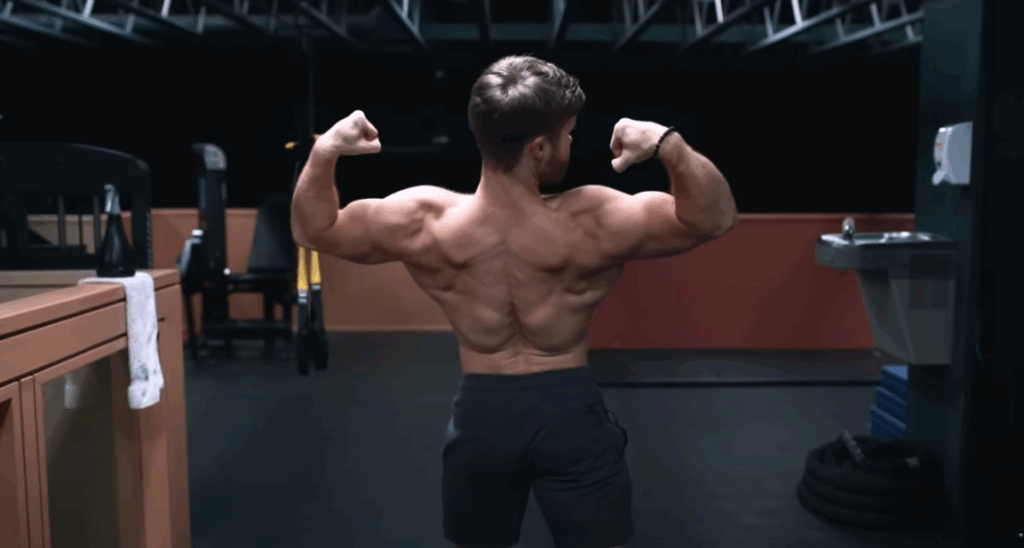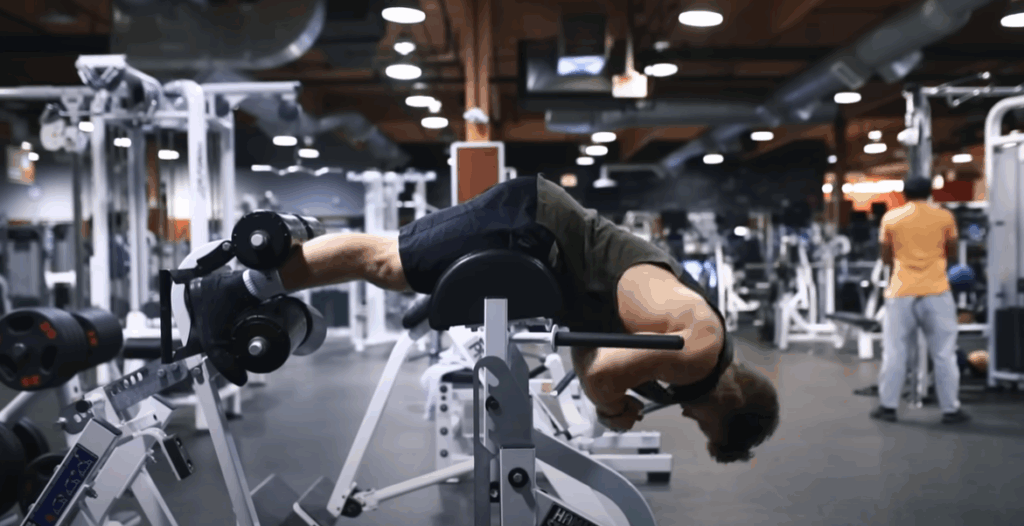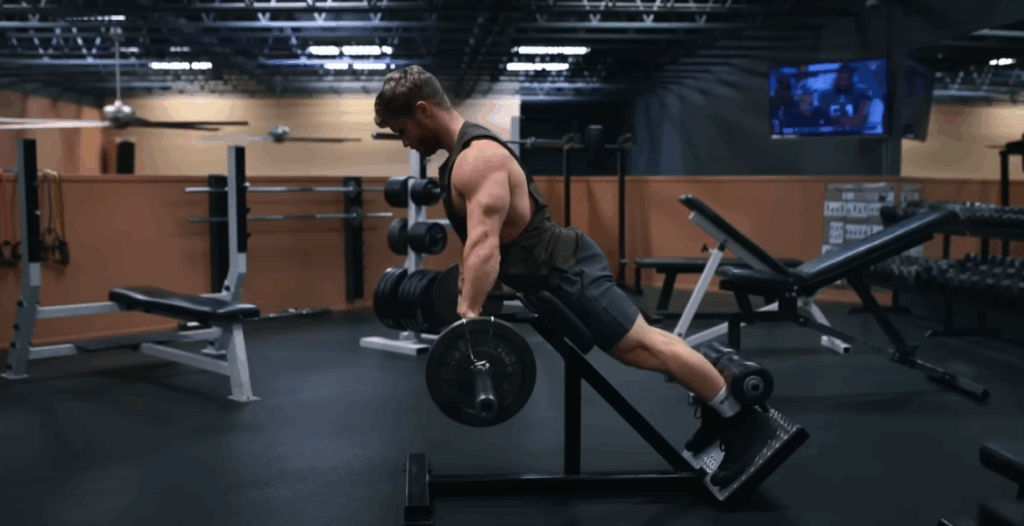Build Your Yoke: Why the Barbell 45-Degree Back Extension is an Underrated Powerhouse for Muscle Growth
When most lifters think of developing a thick, muscular upper body—or the “yoke”—they turn to obvious moves like shrugs, rows, or deadlifts. But there’s a lesser-known exercise that may outperform them all in building your traps, glutes, lats, and even triceps: the barbell 45-degree back extension. While often overlooked, this movement delivers massive benefits to the posterior chain and upper body, provided it’s performed with precision and intent.
Let’s break down exactly why this exercise deserves a spot in your training routine, how to execute it correctly, and what makes it so effective for yoke development.

What Is the Yoke and Why It Matters
In bodybuilding and strength sports, the “yoke” typically refers to the muscles that give the upper body a wide, thick, and imposing appearance. This includes the trapezius muscles, the upper back, rear delts, lats, glutes, and sometimes the long head of the triceps.
These muscles don’t just contribute to overall strength—they’re highly visible even with a shirt on. A well-developed yoke gives your physique that broad-shouldered, power-packed look. While most lifters focus on deadlifts or shrugs to build it, there’s a smarter way to stimulate this entire region in one compact move.
The Forgotten Weapon: Barbell 45-Degree Back Extension
At first glance, this movement might look like a basic lower back exercise. But when performed with a barbell and proper form, it lights up nearly the entire posterior chain—including muscles that are notoriously difficult to isolate.
You’ll need access to a 45-degree hyperextension bench for this lift. While glute-ham raises or horizontal back extensions might appear similar, they lack the unique mechanics of this angled version, especially when it comes to upper back recruitment and barbell loading.
What makes this variation special is its torque curve. According to biomechanics expert Bret Contreras, the force profile of this movement is harder at mid-range than exercises like good mornings, reverse hypers, or even deadlifts. This resistance pattern makes it a game-changer for breaking through mid-range sticking points on your deadlift.
What Muscles Does It Train?
This single lift challenges multiple major muscle groups across several planes of motion:
- Glutes and Hamstrings handle hip extension, powering you through the top of the movement.
- Traps and Thoracic Erectors maintain posture and stabilize your upper back, similar to a loaded carry or heavy row.
- Lower Back (Lumbar Erectors) control spinal extension and keep the torso braced throughout.
- Lats and Long Head of the Triceps engage isometrically to prevent the barbell from drifting forward—much like during a deadlift.
The result is a full-back assault that promotes both hypertrophy and raw strength, especially in muscles that support deadlifting and other heavy compound lifts.

Setting Up for Success: Step-by-Step Technique
- Barbell Placement
Start with the barbell on the ground in front of your hyperextension bench. This isn’t a rackable movement, so make sure you can reach and lift the bar safely. - Adjust the Machine
The pad should align right at the crease of your hips—about where the bar would rest during a hip thrust. Your heels should press firmly into the footplate. - Grip Width
Use a grip that’s slightly wider than shoulder-width (1–1.5x your shoulder width). This increases range of motion and improves upper back recruitment. - Initiate the Lift
Retract your shoulder blades and engage your lats by pulling the bar “into your body” before lifting. As you raise your torso, drive your hips into the pad and push your heels down into the foot support. - Top Position
Finish the movement when your body forms a straight line from your head to your heels. Don’t overextend the back or try to lean too far upward. - Lowering the Bar
Reverse the movement under control, allowing your torso to lower while keeping your back straight and core tight.
Common Mistakes to Avoid
- Rounding the Back
Letting the spine curve during the lift is the most common error. While some rounding might be acceptable if you’re intentionally targeting the glutes, it’s counterproductive when the goal is overall posterior development. - Hyperextending at the Top
Swinging your torso too far backward can strain the lower back. Aim for a neutral spine and let your glutes finish the movement, not your spinal erectors. - Too Much Weight Too Soon
This isn’t a max-effort deadlift. Start light and focus on form. Once your technique is solid, work in moderate rep ranges (6–10 reps) for hypertrophy or higher (10–15) for glute emphasis.
Variations and Focus Adjustments
If you want to shift the focus to the glutes and remove some upper body tension, you can swap the barbell for a dumbbell and round the upper back slightly at the top. This isolates the glutes more effectively and turns the exercise into a powerful glute builder. It’s also a great option for higher rep sets or burnout finishers.
Conversely, if you want to treat this like a power movement, keep the spine braced, load the bar heavier, and perform in lower rep ranges (5–8 reps), mimicking deadlift intensity without the same axial fatigue.
A Secret Weapon for Deadlift Sticking Points
If your deadlift stalls at the knees or mid-range, this lift might be the solution. The resistance curve of the 45-degree hyper places maximal tension at that same position, making it a perfect accessory for powerlifters and strength athletes.
And unlike rack pulls or block pulls, this variation doesn’t let you cheat with momentum or excessive spinal loading. You’re forced to stay tight, controlled, and recruit the right muscles.
Don’t Forget the Neck
When we talk about yoke development, the neck often gets ignored. But it’s one of the fastest ways to appear more muscular in clothes. Just like traps, a thicker neck screams power and athleticism. If you’re serious about yoke training, include neck-specific movements in your routine. Isometric holds, flexion/extension work, and resistance band exercises all get the job done.

Final Thoughts
The barbell 45-degree back extension isn’t flashy, but it might be the most efficient movement you’re not doing for upper body thickness and total posterior strength. It blends elements of hip thrusts, rows, and deadlifts into one compact motion. Whether you’re trying to build bigger traps, crush your deadlift plateau, or simply add more mass to your frame, this exercise deserves a permanent spot in your training program.
Give it a try, focus on form, and train with purpose—you’ll feel the difference and see the results where it matters most: in the yoke.



